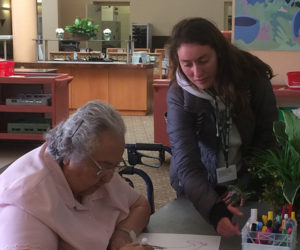 When Andrea Uribe began working last November with memory care residents at Mercy Retirement & Care Center, the stereotypes she knew about older adults with cognitive impairment were quickly dismantled.
When Andrea Uribe began working last November with memory care residents at Mercy Retirement & Care Center, the stereotypes she knew about older adults with cognitive impairment were quickly dismantled.
Uribe, a California College of the Arts fellow who is studying photography, has worked with many children and teenagers throughout her life but had no experience with elders. Dr. Erin Partridge, site supervisor, invited her to Mercy to get to know some of the residents and tell their stories through her photos.
“The ideas I had about elders were the same ones you see in movies, where they are really slow and don’t move a lot – where they are serious, quiet and take lots of medication,” she said. “I was worried I wouldn’t know what to do or say or how to interact with them.”
However, once Uribe began working with the elders on art projects and other life enrichment activities, those fears subsided. “They embrace the curiosity seen in children, but with an older face,” she said. “With memory problems, many things are new to them, but they keep their stories from long ago. They tell stories in a simple way that makes you think they are making it up, but the stories are actually true. I wasn’t expecting that.”
Another surprise Uribe discovered is that a sense of humor does not fade with age (or memory impairment). The residents love making jokes, sharing stories and offering advice. “I wasn’t expecting them to be so funny. One elder was telling me how I could get a boyfriend and how she got a boyfriend. She said I should get a horse because ‘boys like horses.’”
Documentary project
This semester, Uribe will visit Mercy residents weekly and focus on a different theme or activity. “They really want to make things for their family members, like presents or things they can give away,” she said. “We’ll start by making cards, objects and other items that represent who they are and what they like.”
Additionally, Uribe will capture the activities and experiences on film to create a short documentary the residents will be able to watch and share with their families.
Key takeaways from time spent with elders
Uribe said her work with memory-impaired adults has impacted her personally and professionally. She offered a couple of key takeaways for others who are unsure of how to interact with them:
- Get involved with them and their world. Don’t expect anything from them – they may really surprise you.
- Don’t pretend like you know everything; you’re not there to teach them or tell them what to do. Let them teach you. They find power in being an elder, and they want to share their wisdom and experience with the young. They really like that.
- Be a present and active listener. Also, be patient because they may tell you the same story eight times.
- Spend time really getting to know them and give them a chance to show you who they really are.
When Uribe graduates from CCA, she plans to explore additional steps needed to enter the field of art therapy. “It’s been helpful for me to talk to people I’ve never talked to before, like these elders,” she said. “These visits to Mercy have helped me with patience and given me insight into these beautiful human beings.”




















